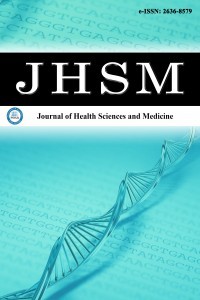
Journal of Health Sciences and Medicine
Yazarlar: ["Kadir Serkan YALÇIN", "Benan KASAPOĞLU", "Recep ALANLI", "Murat Bülent KÜÇÜKAY", "Ahmet YOZGAT", "Murat KEKİLLİ", "Ali KOŞAR"]
Konular:-
DOI:10.32322/jhsm.1094124
Anahtar Kelimeler:Lactose Intolerance,Plasma Glucose,Biochemical Parameters
Özet: Aim: To determine the effect of lactose intolerance on serum glucose levels and related biochemical parameters in the adult population who refrain from consuming milk and milk products. Material and Method: This retrospective, observational study was conducted in a tertiary care hospital between January 2016 and December 2019 with 296 participants. Plasma glucose, calcium, 25-hydroxyvitamin D3, folate, vitamin B12, thyroid-stimulating hormone (TSH), and ferritin levels were controlled. Patients with positive lactose intolerance test results were accepted as the study group and negative results were accepted as the control group, and data of two groups were compared. Results: Of the total 296 participants 212 (71.7%) were found to have lactose intolerance and 84 (28.3%) were found to be normal. In the lactose intolerant group, blood glucose levels were significantly lower than the control group (5.14±0.53 mmol/L versus 5.47±0.54 mmol/L, p<0.001). In the lactose intolerant group, 29 (13.7%) patients, and in the control group 18 (21.4%) patients were having type 2 diabetes mellitus. In diabetic patients, both fasting blood glucose (5.68±0.49 mmol/L versus 6.30±0.59 mmol/L, p<0.001) and glycated hemoglobin levels were also significantly lower than the control group in the study group (6.78±1.08 versus 7.62±0.96, p<0.001). Conclusions: In this study, based upon the findings of people with insufficient milk consumption, any decrease in blood calcium or vitamin D levels was not observed. Lactose intolerant people may have lower blood glucose levels compared to lactase persistent people. Larger-scale and long-term studies are needed to demonstrate that persistence of lactase is an independent risk factor for the development of diabetes.